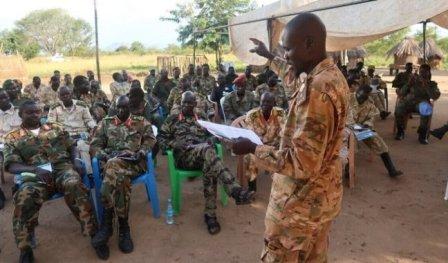South Sudan’s peace is implementation far behind schedules: monitors
December 10, 2021 (JUBA) – The implementation of the revitalized peace accord in South Sudan is far behind schedules earmarked for a transitional period, said the peace monitoring body.
In a speech at the monthly meeting in Juba on Wednesday, Charles Tai Gituai, the Interim Chairperson of the Reconstituted Joint Monitoring and Evaluation Commission (RJMEC) said key provisions are pending implementation.
The meeting was meant to take stock of the activities of the commission and to provide reports of what needs to be done in order priorities by the parties in the coming days.
Gituai cited delayed implementation of transitional security arrangements to demonstrate the huge delay in the enforcement of the peace agreement which may lead to delay the transition towards elections.
“We are now past the midway mark of the timeline of the Transitional Period. The parties are far behind schedule in the implementation of key tasks. As we close the year 2021, therefore, we need clarity from the Revitalized Government of National Unity (RTGoNU) on its plan for the implementation of the outstanding tasks in the coming 14 months.”
According to the 2018 revitalized peace pact, South Sudan expects to have trained and graduated at least 83,000 troops.
Parties and their leaders have been quick to attribute the delay to a lack of financial resources as the reason for delaying graduation for unified forces.
The monitoring body expressed disappointment with the way in which the leaders have taken up the responsibility, saying the lack of progress in the reforms is contributing to pervasive frustrations in the country.
“It is now over two months since the Presidency directed the deployment of three assessment teams to training centres in preparation for the graduation of Phase 1 of the NUF (Necessary Unified Force). It is disheartening to see that this directive of the Presidency has not been carried out,” said Gituai.
He further expressed concerns that defections of senior military officials mainly from the Sudan People’s Liberation Movement-in-Opposition (SPLA-IO) to the South Sudan Peoples Defence Forces (SSPDF), “erode trust” amongst the two main peace partners and public confidence in the peace process.
“The situation has undermined the morale of security forces cantoned or in training and risks eroding their trust in the political leadership of the country,” he said.
It was reported that the delays to graduate forces in the training camps pushed soldiers to abandon cantonment and training sites across the country due to a lack of food and medicines.
President Salva Kiir at the conclusion of the governors’ forum this month attributed the cause of delay to differences over the sharing and allotment of positions in the command.
Kiir wants his group to take 60% of the representation in the unified command and 40% to other parties. His deputy, Riek Machar, however, reject the arrangement, pointing to equal representation.
The arrangement, according to Machar and members of his group, gives them and other political parties 50 and the government with allies 50%. Kiir objected to the proposal, resulting in the deadlock and subsequent delay in the graduation of the unified forces.
The screening of the forces to conform to conventional military settings and formations has also been another factor.
(ST)

